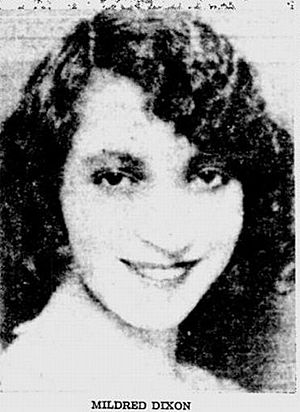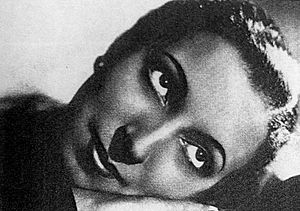Mildred Dixon facts for kids

Mildred Dixon (born November 21, 1904 – died September 18, 2001) was a talented dancer. She performed at the famous Cotton Club in Harlem, New York. Mildred became a longtime companion of the well-known composer and musician, Duke Ellington. She also helped manage his music company.
Contents
Early Life and Dance
Growing Up and Dancing
Mildred Dixon was born and grew up in Boston. Her parents came from a place called Africville in Nova Scotia, Canada. Her family were descendants of Black Loyalists. These were formerly enslaved American people who gained freedom during the American Revolutionary War. The British helped them move to Nova Scotia. Mildred and Duke Ellington often visited her family in Africville.
Boston had a lively Black community. Mildred learned tap dance and other kinds of stage dancing there.
Moving to New York
Mildred moved to New York City to work as a dancer. In the mid-1920s, during a time called the Harlem Renaissance, she joined the Cotton Club. This was a very popular nightclub in Harlem. She became famous with Henri Wessell. They were a dance couple known as "Mildred and Henri." People said they were one of the "most exciting dance acts" in America.
Meeting Duke Ellington
Mildred met Duke Ellington on December 4, 1927. This was the first night he and his orchestra played at the Cotton Club. The club became his main place to perform for many years. Mildred and Duke worked together on many shows. These included "It’s the blackberries," "Springbirds," and "Pepper-pot Revue."
They started a relationship in 1928. In 1930, Mildred and Duke Ellington moved in together. Their home included Duke's son, Mercer, and Duke's parents.
Working with Duke Ellington
Mildred was Duke Ellington's companion from 1928 to 1938. During this time, she also worked as the manager of his company, Tempo Music. In this decade, Duke Ellington wrote some of his most famous songs. These include "Mood Indigo" (1930), "It Don't Mean a Thing (If It Ain't Got That Swing)" (1932), "Sophisticated Lady" (1933), "Solitude" (1934), and "In a Sentimental Mood" (1935).
When Mildred moved in with Duke, his son Mercer Ellington was 10 years old. Mercer later wrote that he thought of Mildred as his mother. He lived with her for ten years. Mercer also wrote that Mildred had a natural elegance, just like Duke Ellington.
Their relationship eventually ended.
Legacy
- Mildred is the inspiration for Duke Ellington's song "Sophisticated Lady" (1933).
- The song "Duke’s in Town" by Joe Sealy is about Duke Ellington and Mildred's visits to Africville. This song is part of Sealy's Africville Stories in Music album.
- Mildred's cousin from Africville, Clara Carvery Adams, is the inspiration for Duke Ellington's song "Clara."
 | Precious Adams |
 | Lauren Anderson |
 | Janet Collins |


